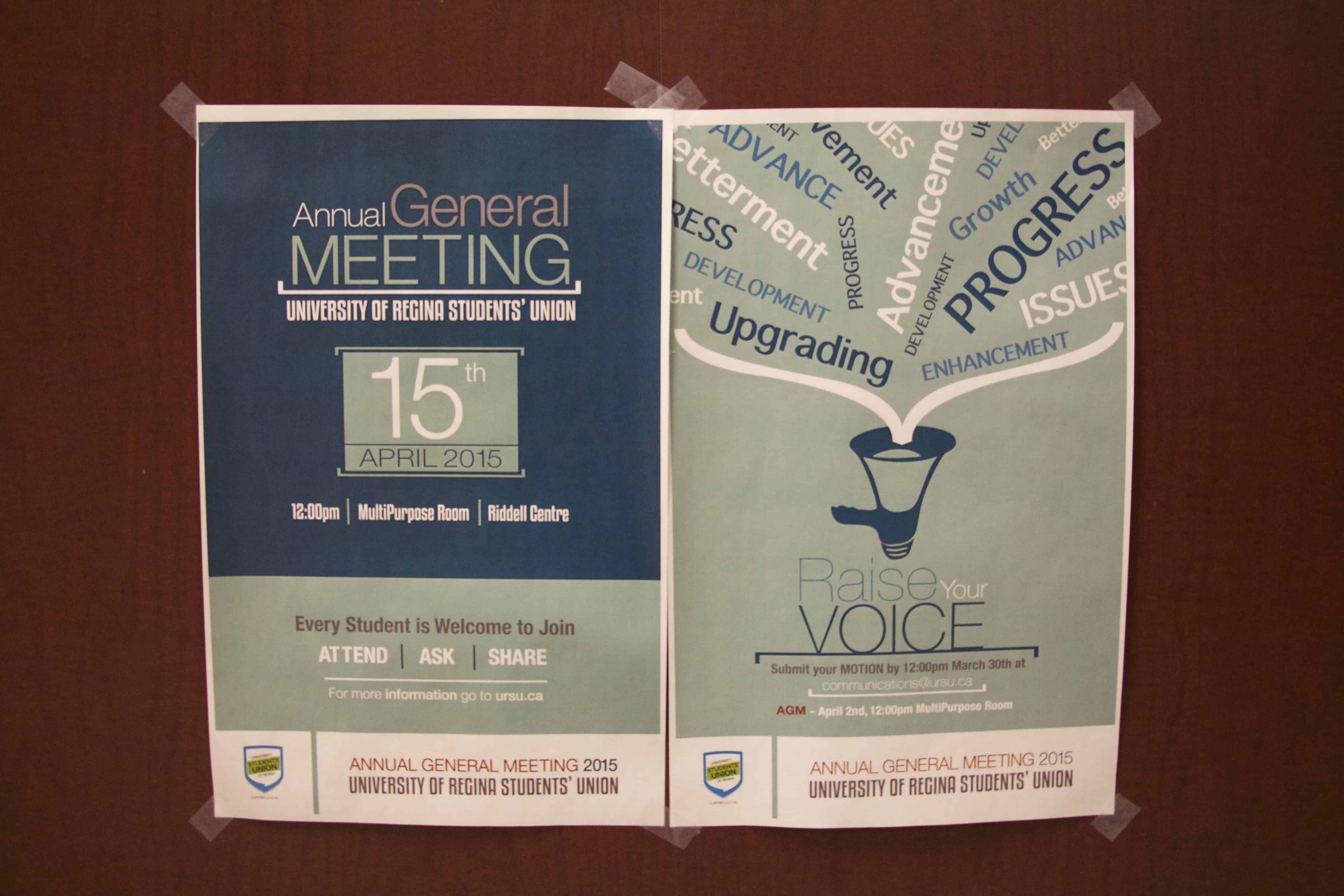Upcoming URSU AGM

Motion calls for vote to change RPIRG opt-out clause
The University of Regina Students’ Union (URSU) annual general meeting (AGM) will be held April 15 at noon in the multi-purpose room. Brad Lulik is on the agenda to be voted in as board chair.
First on the agenda will be a presentation of URSU’s audited financial statements, followed by a financial update. Following presentations, a motion will be put forth to re-appoint MNP as the auditor for URSU’s 2014-2015 fiscal year. Next will be a motion to accept an amended election and referendum bylaw change.
In special business, there are a number of motions pertaining to the constitution and elections. These motions largely seek to increase student involvement in URSU by increasing student input and reducing strategic voting.
The first motion addresses the collection of the Regina Public Interest Research Group’s (RPIRG) fees. The motion proposes that the “poorly advertised” opt-out be swapped for an opt-in and that “the RPIRG fee be collected only from students who expressly opt-in to RPIRG membership.” An opt-in would put the onus on RPIRG to advertise itself to students. The opt-out to RPIRG can easily be found on their website, under About Us, Membership, and there is a downloadable form there.
Here’s an example of RPIRG has been able to do in the past with help from student fees.
Third year business administration student Conrad Hewitt, who wrote the motion, stated, “RPIRG has repeatedly used student fees to advance a clear and partisan ideology. I absolutely support the practice of active political student groups on campus, but using student fees to fund them detracts from the integrity and political neutrality of URSU. While I recognize that students do have the option to opt out of the RPIRG fee, I’m one of very few. This option is poorly advertised and as a result, rarely utilized. In any case I think you would be hard pressed to find someone at the U of R who truly believes that a lack of rejection constitutes active consent.”
Executive director of RPIRG Anna Dipple explained that the motion is “extremely problematic. Since we know students won’t take the time to opt-in, this motion effectively means RPIRG will lose funding as an organization… RPIRG is a student funded, student run center that promotes social and environmental justice issues. RPIRG has existed for 8 years, and in the last 4 years alone has given out over $100,000 in funding to students and student projects. RPIRG also provide many hours of free programming and training opportunities over the year for students to take-part. Without adequate funding, RPIRG won’t be able to continue providing the programming, funding and training that students have benefited from for the past 8 years.”
As it stands you can opt-out of the $6 annual fee to support RPIRG, check out their website for more.
Next, there is a motion regarding levies and fees. It is based on the assumption that “establishment and abolishment of new fees/levies should take place via referendum to ensure members are adequately consulted.” The motion would change the constitution and add the following clause to article IX: “Levies paid to student groups (ex: The Carillon, The Women’s Centre, etc) of the students union may only be established, modified or abolished by referendum as laid out in the Elections and Referendum Policy.”
Following that will be a vote to give the board of directors the power to change the physical appearance of the constitution to make it “more accessible to students.” The vote will add a clause to article XIV of the constitution that reads: “Non-material changes to the constitution (ie: layout changes, correction of grammar, updates to policy names, simplifications of sentences) may occur with the approval of the Board of Directors, subject to recall as laid out in Article IX.” This motion is complemented with a further motion to undertake a review of URSU’s constitution to edit for redundancy and unnecessary clauses.
The final motion addresses vote splitting among similar candidates. To address strategic voting, the elections and referendum bylaw will be edited so that “the Alternative Voting system is used in all future elections. As described by voters ranking candidates from most to least favoured. Following this the candidate with the lowest amount of votes is eliminated from the race with their votes going towards whoever was ranked [second] by each individual voter. The process of eliminating the bottom candidate and redistributing their votes continues until a candidate gains over 50 per cent of the vote.” Doing so will ensure that votes do not result in “candidates representing an electorate even without collecting over 50 per cent of the vote.”
President Devon Peters says he thinks an alternative voting system “seems like a really cool idea,” adding that he is “excited to have lunch, talk issues and vote things that matter for students.”
Peters also stated, “URSU will consider the possibility of holding a [special general meeting], should we not reach quorum. Date and time are TBD.”










